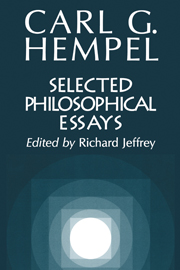Introduction
Philosophical Essays, Early and Late
Published online by Cambridge University Press: 05 June 2012
Summary
The working title of this collection was “Philosophical Essays, Early and Late” – that is, earlier and later than the essays of Hempel's middle period, which are collected in his Aspects of Scientific Explanation and Other Essays in the Philosophy of Science [54]. They were published in two decades (roughly, 1945–1965), during which logical empiricism evolved from an arcane neo-Kantian or counter-Kantian sect into something that would seriously be called “The Received View” – a view whose shape and reception owed much to those very essays. They were essays in the sort of logical constructivism that Russell had framed in Our Knowledge of the External World as a Field for Scientific Method in Philosophy (1915). Russell's book was the inspiration for Carnap's Der logische Aufbau der Welt (1928), and for the Logische Syntax der Sprache (1934), which incorporated Carnap's version of “physicalism.” In those two decades Hempel could still regard the failings and limitations of that work as mere bumps on the road to logical empiricism. This book of Hempel's essays charts his course into and out of the methods and concerns of that middle period.
Having been one of the first logical empiricist graduate students, Hempel would become the last survivor of the Berlin and Vienna circles. Throughout, he was in close intellectual contact with the major figures in the movement – and a movement it was, defined for its activists by no doctrine but by a certain morale and discipline.
- Type
- Chapter
- Information
- Selected Philosophical Essays , pp. 1 - 4Publisher: Cambridge University PressPrint publication year: 2000



